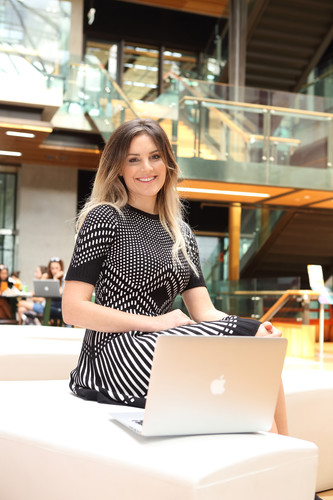Mentoring is something that all great professionals climbing the corporate ladder are told they need, but how do you find and connect with top mentors?
We all know that one person who says they just organically found their amazing mentor and now their career has transformed! But what happens when you want to take destiny into your own hands and are ready to form an amazing professional bond right now?
Current UQ Master of Business Administration (MBA) student, Holly Tattersall knows firsthand just how valuable mentoring is. It was her own experience as a mentee that helped pivot her career and made her realise those crucial relationships should be accessible to young professionals.
She successfully formed Women in Digital, based on the demand for a community to provide mentoring and connect likeminded women in a supportive environment.
“It was early in my career and I was relatively new to the digital recruitment world. I wanted people around me that I could relate to, learn from and look up to – that is when I noticed a need for role models and leaders in the industry,” says Holly.
“Mentoring shouldn’t be a luxury that is only available by chance, making tangible connections and gaining the expertise of industry leaders should be accessible to all.”
“Being guided by a mentor gave me the confidence to start my own digital recruitment venture, running a profit for purpose business. In my case, mentoring really did transform my career.”
Holly shares her top tips for how to find and meet mentors, connecting with them and how to provide value to each other.

What is a good way to find and meet potential mentors?
There are a number of ways people can search for and attract great mentors. Number one is obviously presenting yourself very well on LinkedIn. In the business world, that is generally the first place people go to learn more about you. You want any potential mentor to be impressed, not put off when they land on your LinkedIn profile.
Then it really is just about getting out; attending networking and business events and putting yourself out there by contacting or connecting with potential mentors and not being afraid to ask - ‘will you mentor me?’.
What is the most effective way to connect with a mentor?
There are so many different ways that people can connect with mentors – LinkedIn, emailing, networking events, leveraging mutual connections and the list could go on.
What is important to remember and be considerate of, is that the person you want as a mentor is probably a busy person and receiving a lot of mentoring requests from others. So, be clear about what you are seeking in that relationship and what you need help with.
Most mentors will appreciate some structure to the meetings and specific topics to discuss. Asking for a casual coffee to pick someone’s brain generally won’t be as well-received as a request to gain advice on salary negotiations. Specificity is key!
What’s the best way to ask someone to be your mentor?
As mentioned, you want to be considerate of this person’s time and expertise. A good mentor will be in high demand and they only have so many hours in a week. How are you going to stand out from the crowd? Why should the mentor spend an hour with you versus the next person? Are they going to be able to help you solve that problem?
I know someone who sent a business-based book along with some flowers to ask someone to mentor them. That approach, I imagine, would have a much higher success than a cold email.
What qualities should you look for in a good mentor?
In terms of qualities, it ultimately depends on what type of person you are and what you are looking to get out of the relationship. As a general rule, I would recommend looking for someone that you can relate to and vice versa. Honesty is also a big one; you want someone that will be open and transparent with you and won’t shy from the hard conversations.
When it comes to finding a high-quality, long term mentor, many people forget about a very important aspect – having something in common with the person!
If you can share common ground, you can connect and form a really strong relationship.
Is it ok to have more than one mentor?
Absolutely! No two people are the same and two different mentors will provide different perspectives and advice. Ultimately, the decisions you take and the path that you follow will be uniquely yours so the more objective perspectives you can gain (beyond your inner circle) the better!
How can/does a mentee provide value to a mentor?
To have a successful relationship, you need to ensure it is mutually-beneficial and that you, as a mentee, are providing value to the mentor. Reverse-mentoring is a great way to do that!
A classic example of reverse-mentoring is where the experienced mentor can leverage on the lived-experiences of the younger mentee. For example, the mentor may be having a staffing issue and would like to know how to best handle the situation; they can go to their mentee and talk it out and get the mentee’s perspective as an employee. This is incredibly empowering for the mentee - they realise that they do have something valuable to bring to the table.
If reverse mentoring isn’t an option, then you should always ensure you are providing feedback on the situation and results from the mentors’ advice. Mentors mostly give up their time for the satisfaction of helping others, so make sure you share how their advice helped (or not), which provides them with an incentive to stay invested.



